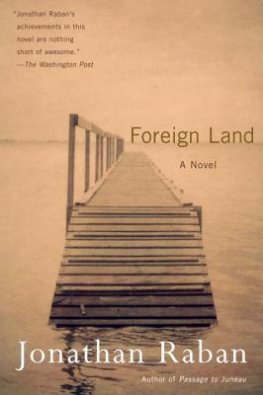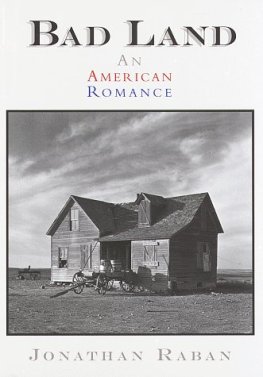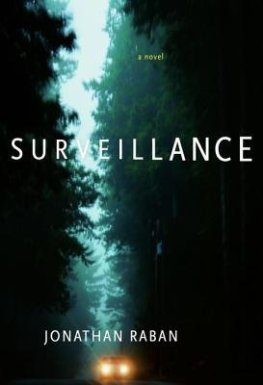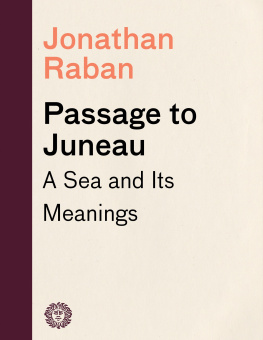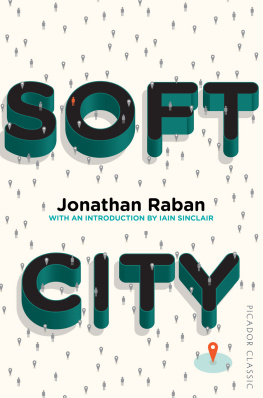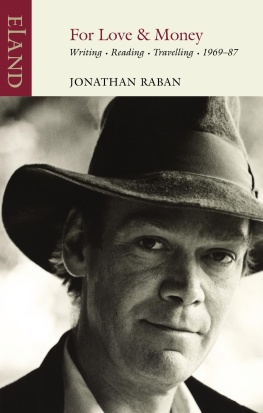Jonathan Raban
Foreign Land: A Novel
for Christopher MacLehose
who helped
It was a shadowless London morning; a grudged measure of twilight between darknesses. They breakfasted under a bare 150-watt bulb. Sheila worked her passage through a plate of All Bran, Tom drank coffee from a mug with a thick and warty glaze. The window of the tall room at the back of the house showed a lawn of fallen plane leaves, a clogged birdbath, a torn fence, and then the city, lying far below them like a lake. It was thunderously still and black.
Sheila held her fathers letter, a single sheet of onionskin.
Hes coming back. For good, he says.
Tom was staring at the stamp on the envelope. There was a flag, with some gaudy Third World heraldry on it, a sword, a fishing boat, a torch, some sort of tree.
Great, Tom said, losing the word in his beard. He went on looking at the stamp. Then, Why?
What do you mean, why? Hes sixty.
I thought he might be ill. Or something.
Oh, he isnt coming here. Hell go to my grans old house in Cornwall. Thats why he kept it on.
Is that a baobab tree, do you reckon?
Ive no idea. Probably. I suppose thats what they have out there.
Is that what you want? Tom said.
I dont see that it really makes much difference. London to Cornwall is as far in time as London to Bom Porto.
Bom Porto, Tom said with a faint snuffle. It was difficult for anyone to pronounce the name of the place where her father lived as if they meant it seriously. At least his transfer to St Cadix would solve that problem.
Its his deathbed repentance. It has to be a wrong move. He cant know England any more. Its a foreign country. Whatll he do here? Hes got some chocolate-boxy picture in his head of spreading elms and village pubs and thatch with everything. Poor old bugger.
Perhaps hes just fed up with the heat.
Sheila laughed. Tom, surprised, smiled at pleasing her so easily.
Yes, thats what this countrys for. Its a place where people come to cool off.
Tom watched her, his lips moving slightly behind his Mr Rat whiskers. He got up from the breakfast table that hed carpentered when he first moved in. Sitting at it, feeling its bare grain under her fingertips, she felt soothed by its weightiness.
Do you want me to go to the shops first? Or fix the van?
Shops, she said.
Okay, said Tom. His extraordinary specific gravity made the room seem to float as he left it.
Sheila carried her mail up to the study at the top of the house. It was a room too small for Tom. He always stopped at the doorway unless hed come to repair something. Tom had built the bookshelves: a honeycomb of varnished oak to replace the piles of bricks and boards that Sheila had made for herself. Tom installed the telephone answering machine. Tom framed and hung the pictures on the walls. He had created this working place for her, then gone below. She noticed that when he did come to her study, he dipped his head and gathered his great shoulders together in embarrassment, like a man in church. She would lend him books from the shelves, and hed carry them cautiously off in hands as big as a pair of garden spades.
She could hear him now, rumbling somewhere downstairs like a passing underground train. She needed his bass accompaniment in order to work; had come to depend on his noises, of banging and sawing and drilling, and smells, of machine oil, turpentine and pine dust. Sometimes she would go down at the end of the day and find whole walls gone and Tom, looking huge and rimed, saying Is that what you want? Yes, on the whole; though it was still hard to be sure of what Tom wanted. There were days when she found his consoling presence in the house perfectly inexplicable, like some extravagant anonymous gift.
Outside, the top branches of a leafless tree were waving in silly semaphore. She spread her fathers letter on the desk. It was exactly the same as his letters always were, covering one and a third sides of the paper; the handwriting was upright, the grammar good. It ended, Much love, George. Her father was not one to squander a lots of or an all my on his daughter; she saw his much as a quantity that he had weighed out with some care. It was a little more, perhaps, than a teaspoonful; a good deal less than a dessert spoon. It was not much.
Even so, she was excited. Her father was coming home, and the news lay like a splash of sunlight on the desk. About time too, (here she put on the steel-framed glasses that made her look like a governess in a Victorian novel); she had waited for years to make a reckoning in that department.
All daughters should make a reckoning with their fathers. Sons did it all the time. Every rambling memoirist found room for a chapter or two in which he could fork over his old oedipal battles with the family patriarch. Daughters did it rarely and when they did, it was usually hedged and reluctant, with too little bite and too much routine irony. Where the sons tasted blood, the daughters drew back: no sooner had they inflicted a small scratch than they were fussing about with the Savlon and Elastoplast. Sheila, in theory at least, believed that fathers should be tackled boldly. They called for a heavy spanner or a sharp knife.
She had made her reckoning with her mother long ago. No-one had been hurt in the process of accountancy; Sheila had simply emerged, slowly, as the parent, with her mother as a sort of dizzy teenager. Now Sheila scolded her mother down the telephone line to Norwich, posted money to her in rather large, irregular sums, and organized her mothers trips to London so that there were very few minutes of these weekends left over for mischief or introspection. She took her mother to the Zoo, the Planetarium, the Sir John Soane Museum, Fortnums, the National Portrait Gallery and by riverboat to Greenwich all childish treats that Sheila had never had as a child herself.
But her father had evaded her. He was like the dinner guest who is never seen again after the soup. He had slipped out of her life without even an excuse me.
She had been five, going six. They were living in Aden. She felt cheated of Aden too, since the journey back to England with her mother had been such an adventure that it blotted out practically all memory of the life which had gone before, and caused it. They had kept on going up and coming down again in aeroplanes. First Cairo, then Athens, then Rome . The overnight stop in Rome had a useless clarity in her head; it sat there, glowing to no purpose, like a colour transparency in a plastic viewer. Then they had flown in the Comet. Super!! she had written, in wonky capital letters, across half a world, to that unperson, her father.
There must have been quarrels, red eyes, single beds, chilling public declarations, but she couldnt recall any. When she thought about Aden, all that came to mind were irrelevancies, like the grown men no taller than herself, with heads like eggshells, or the huge, brassbound mahogany wheel of a big ship that shed been taken to see. In the wheelhouse, she could still make out the bearded English captain (he had given her a rough-cut opal, which she lost and mourned). The man standing next to him must be her father. He was a certain disposition of space; but the light passed clean through him.
In the movie version of Sheilas childhood, it was unclear to her whether her father had ever had a part to play at all, or whether his scenes had been edited out at some late stage in the production. Things had been no more satisfactory since shed been a grown-up.
He had the unfair advantage of someone who stays in hotels. On his English leaves, when not in Cornwall he put up at a gilt and chocolate affair which was hidden around the back of St Jamess Street. This offended Sheila. Fathers, in her experience, didnt stay at hotels at least they did so only in the country, and only then in overgrown pubs with names like The Railway or The Crown and Anchor. All fathers needed was a place to sleep: a spare room was royal luxury, and they were happy to bunk down on sofas among empty glasses under a canopy of smoke. Not her father. Shielded by switchboard girls, by Hes not in his room and Can I take a message?, he was as invulnerable in London as he was in Africa.

